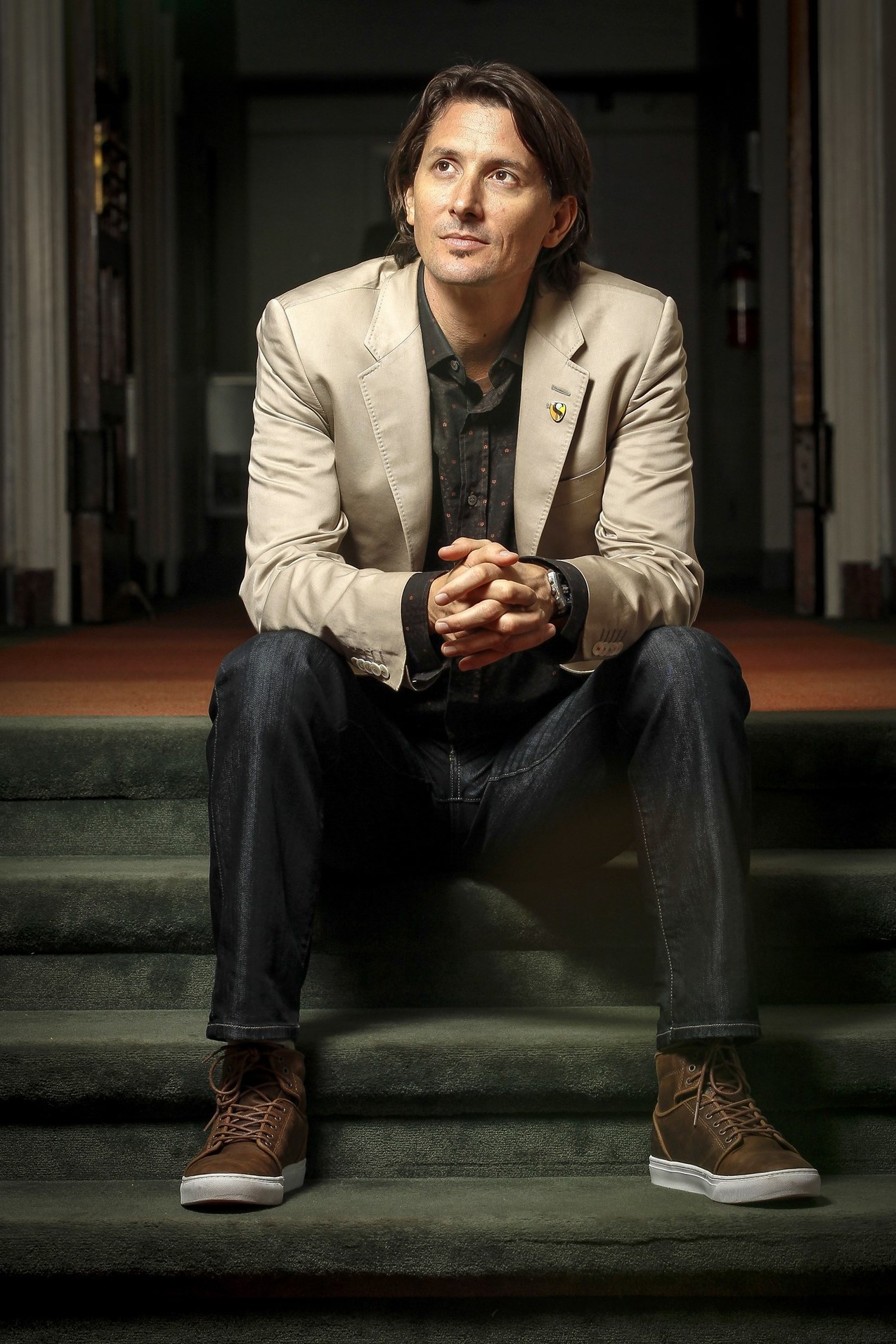I’m interviewing Rob Nail, but I don’t know who to make eye contact with, him or his toy robot. The white-and-aquamarine bot blinking at me innocently is named Wesley. He retails for $20,000, is Wall-E cute and is roughly the size of Nail’s 19-month-old son.
Nail hardly notices. In fact, he’s oblivious to all the strange stuff surrounding us: the Oculus Rift viewing station where, moments before, I rode a virtual roller coaster; the model airplanes hanging from the ceiling; and the other robot, which retails for $14,000 and which Nail once used to stream himself to a party. Instead of, you know, actually going.
At 42, the tech hipster is the CEO of one of Silicon Valley’s oddest futurist meccas: Singularity University, an unaccredited “institution” that convenes tech evangelists, educates midcareer executives at conferences, incubates new startups and teaches middling corporations how to “disrupt” themselves. It earns the gazes of such luminaries as the prime minister of Italy, Ashton Kutcher and companies like Google (duh). And all for the stated mission to change the face of humanity … for all billions of us.
Only, how do we reach our 22nd-century utopia? That’s where Nail — and his bot-filled playroom — comes in. Singularity’s hyperopic co-founders, futurists Ray Kurzweil and Peter Diamandis (names that elicit boy-band shrieks in the Valley), know what they want the world to look like. Nail does too. Just before our interview, he took the stage with Wesley at an SU conference while the Styx song “Mr. Roboto” blared — you could almost feel the head-banging in the audience of mostly white dudes in button-downs — and gave what you could only call a stump speech in favor of the robots. “Give the robots some love,” he said. Wesley added, in a slightly creepy voice, “I am not going to take your jobs.”
Of course, that’s exactly what the interim stage between now and Kurzweil’s then will mean: some “adjustments,” as Nail puts it. He’s concerned, fairly, about regulators and about how the labor market will contract and then, he says, expand to create new jobs thanks to the bots. But in Nail’s mind, Singularity is around to help make the transition. Take SU’s work with Fortune 500 companies like Lowe’s and Coca-Cola and biotech company Genentech to help them, yes, “disrupt” themselves. Nail has spearheaded those ops since he came on as CEO in October 2011, says Singularity’s chief impact officer, Emeline Paat-Dahlstrom.
One of Nail’s other success projects, she says: turning Singularity from nonprofit to benefit-corporation status. She adds, “Before, we were on a linear path. Rob’s impact has been exponential” (a favorite word choice of everyone at SU). But in the six years since Singularity was founded, it still hasn’t become profitable and may not keep up with its huge ambitions. It’s also one of those easily dismissible Silicon Valley things: so quirky, so cultish, so self-prophetic that it’s hard to see whether its lexicon of journeying-toward-space-odyssey will translate.
Nail is not just a talking head, though; his background is technical. He co-founded a life-science robotics company with his college buddy JoeBen Bevirt. Bevirt says he talked Nail, who wanted to go build bridges in Nepal, into the gig. They grew fast and were acquired by Agilent Technologies in 2007. Today, Nail calls himself “not a great engineer,” preferring to run things in place of those tech visionaries who “couldn’t manage their way out of a box.” (Bevirt says Nail is a “spectacular engineer who compares himself with some of the greatest in the world — he’s too harsh on himself.”)
In either case, the surfing enthusiast is a people person — a great skill to have in programmer land — and he’s good-looking, with a gaunt, Sirius Black face and nonchalant shoulder-length hair. Sitting in SU’s Innovation Lab, Nail is decked out in a plaid blazer with an “S” pin on the lapel, dark wool pants and neon green kicks. We talk education. SU is proud of its unaccreditation, praises online courses and is steeped in the Peter Thiel/Coursera zeitgeist of schooling skeptics. Nail himself holds two degrees, a bachelor’s from the University of California at Davis and a master’s in engineering from Stanford. But he tells me there are “apps that could teach better than some classes.”
Then again, perhaps he should be skeptical. A first-generation college student, born to a blue-collar Vietnam-veteran dad and a part-time-working mother, Nail graduated from a high school class in Sacramento from which only three kids went to college. Though Nail was ranked third in his class, with straight A’s, a career counselor advised him to apply only to community college.
As for the next 20 years, Nail has a whole other stake in making them go smoothly: his son, Beckett. Nail and his musician wife depended on in vitro fertilization technology to have him — even here, he enters an evangelical speech about society’s skepticism of post-genetic diagnoses, which would allow parents to analyze the genetics of a fetus to determine if their future child has a disease. It’s controversial, ethically, religiously. But, he insists earnestly, “most of the world is too scared to talk about this stuff. We have to be able to.”
Sourced through Scoop.it from: www.ozy.com




Leave A Comment